5 conclusions from the women's Tour of Flanders
Boels Dolmans dominate, Trek-Segafredo misfire, Van Vleuten's last race with Mitchelton-Scott and more
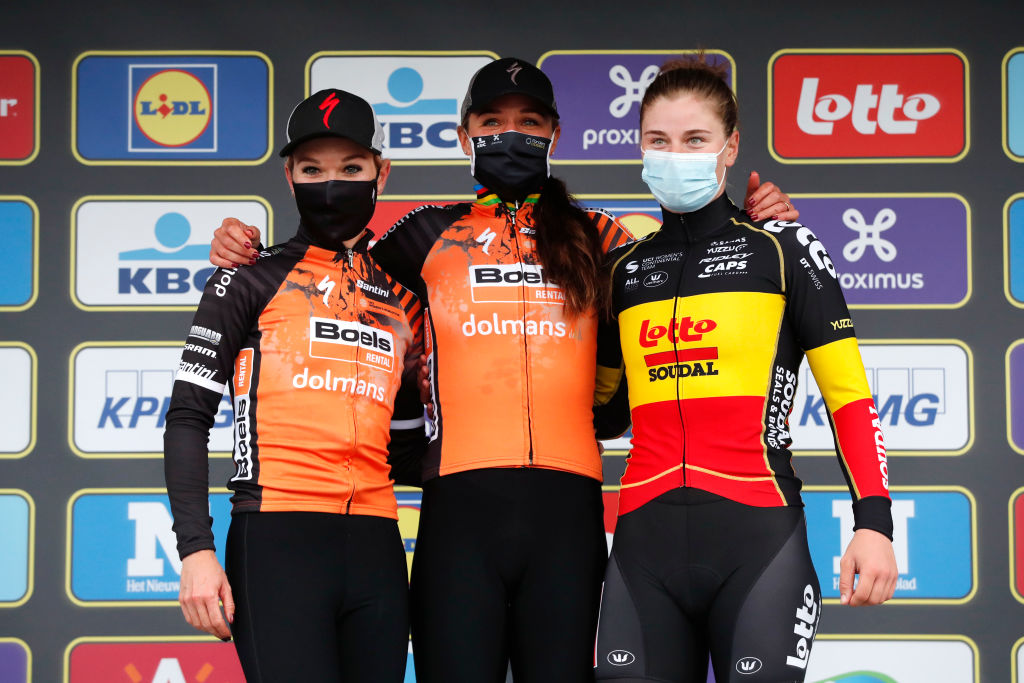
The 2020 Tour of Flanders concluded on Sunday with Chantal van den Broek-Blaak securing the victory in Oudenaarde.
The race marks the near-end of the Women's WorldTour revised calendar, with just two races still to come at Brugge-De Panne on Tuesday and the Madrid Challenge, held from November 6-8. However, as the second wave of COVID-19 sweeps across Europe, it is looking less likely that the series will reach the finale.
Cyclingnews looks at some of the takeaways from this year's Tour of Flanders.
Boels Dolmans dominate
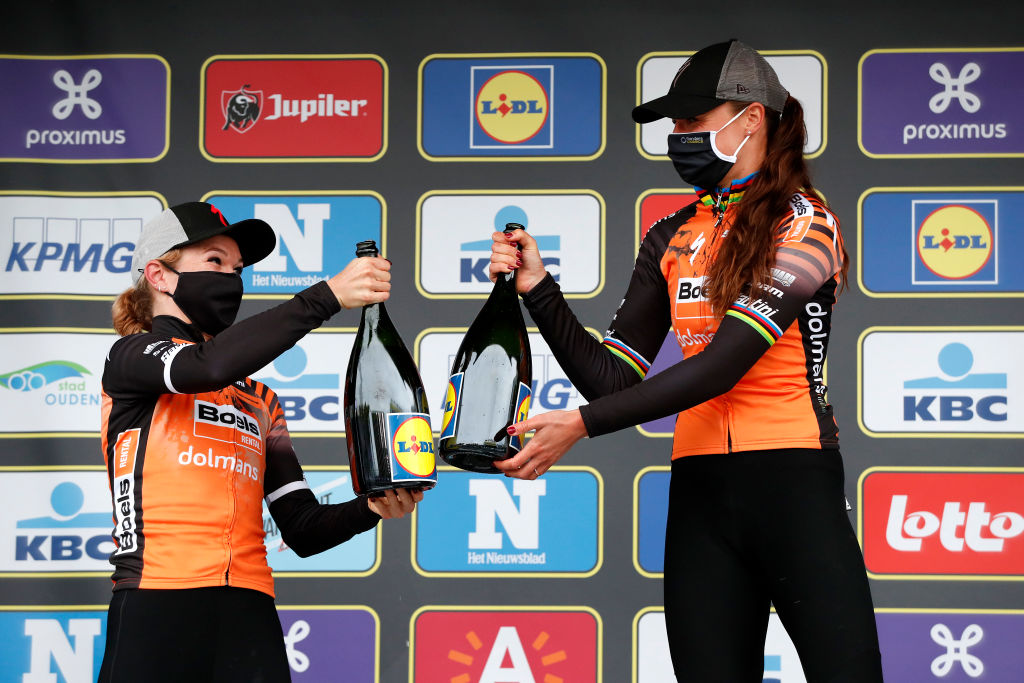
Boels Dolmans started the Tour of Flanders as the team-to-beat, and they did not disappoint with Chantal van den Broek-Blaak securing a solo victory and Amy Pieters taking second place from the chase-group sprint. Newly crowned double world champion Anna van der Breggen was also in the decisive chase group and finished 11th on the day, crossing the line with a fist pump in celebration of her team's success in Oudenaarde.
The team was always going to be hard to rival as it also lined up with Jolien D’hoore – one of the fastest sprinters in the peloton – who had just won Gent-Wevelgem last weekend. She has always wanted to win the Tour of Flanders, which has not seen a Belgian winner since Grace Verbeke 10 years ago. D'hoore did not make it in the select chase group that formed behind Van den Broek-Blaak, and she remained in the main field. Although Belgian roads race champion Lotte Kopecky (Lotto Soudal) was in the chase group and finished third, Belgium will have to wait another year for a potential winner.
Together, Boels Dolmans covered all the bases for a team victory, with Van den Broek-Blaak forcing a solo breakaway over the Oude Kwaremont, while Van der Breggen and Pieters covered the moves behind. Had the race come back together, D'hoore would have been there to win the bunch sprint.
Trek-Segafredo leave Longo Borghini isolated
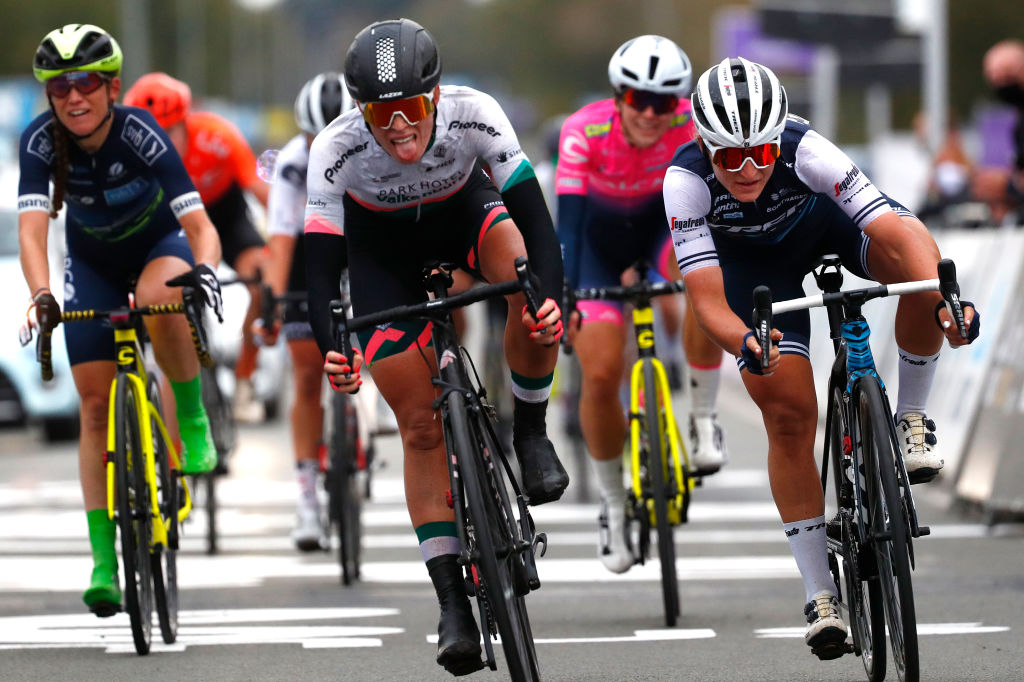
Trek-Segafredo lined up with three former winners of the Tour of Flanders with Lizzie Deignan, Elisa Longo Borghini and Ellen van Dijk – which gave them good odds. The team has also shown impeccable tactical performances this year to win the GP de Plouay, La Course and Liège-Bastogne-Liège, all with Deignan, who is leading the Women's WorldTour. In addition, the teamwork between Deignan and Longo Borghini, up until this point, has been something special.
Get The Leadout Newsletter
The latest race content, interviews, features, reviews and expert buying guides, direct to your inbox!
At the Tour of Flanders, however, there seemed to be a disconnect, or perhaps a misfire on tactics, that led to Longo Borghini finishing a disappointing eighth place – the highest place for the American outfit – while Deignan did not finish the race.
When the race kicked off over the more decisive late-race climbs – the Kruisberg/Hotond, Oude Kwaremont and Paterberg – Longo Borghini seemed to be left on her own, and she was the only Trek-Segafredo rider to make the decisive chase group behind solo winner Chantal van den Broek-Blaak (Boels Dolmans).
"It was a really tough race and the team worked really well, but in the end I was isolated with a little too many Boels riders," Longo Borghini said. "I tried to follow the attacks, and in the end, I also tried to do the sprint. I finished [eighth], which was not the result we were aiming for, but we have to be content with this. It was a very hard race and not easy to control."
Van Vleuten's attack comes up short
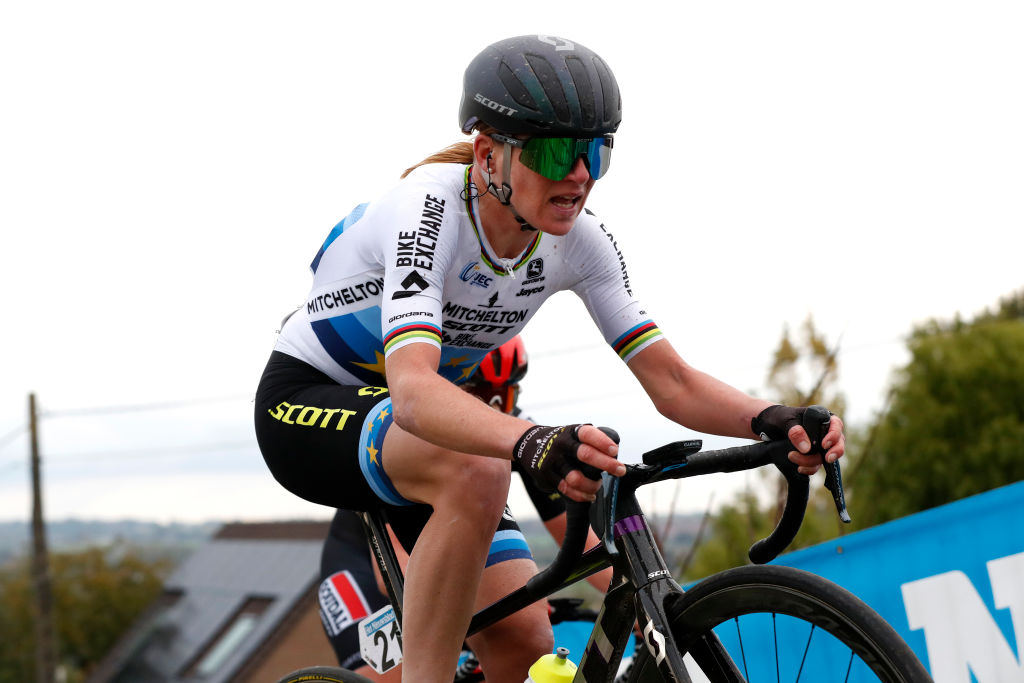
It's a rare occasion when Annemiek van Vleuten's attack doesn't result in a victory.
At the Tour of Flanders, one of her final races in the Mitchelton-Scott colours before moving to Movistar in 2021, Van Vleuten attacked over the Kruisberg, a 2.6km climb located at 106km into the women's 135km race. The peloton had thinned and it appeared to be a perfect trademark move from the rider who has won seven races this year in similar fashion.
"I thought I had a very good attack when we raced down the Kruisberg," said Van Vleuten, who fractured her wrist in a crash at the Giro Rosa last month. "There were a number of attacks, which I got over well, and afterwards, I attacked to ride alone. Unfortunately, Anna van der Breggen managed to join me and she did not want to ride. That was no surprise to me, but it was a shame. I knew I had to go solo."
Double world champion Van der Breggen bridged across to Van Vleuten and chose not to work because Boels Dolmans had several winning cards to play in the group behind.
Once reunited with the main group behind, Van Vleuten moved into a domestique role for teammates Sarah Roy and Grace Brown. Boels Dolmans went on to win solo with Chantal van den Broek-Blaak and take second with Amy Pieters, while Roy finished fifth, Brown was 14th and Van Vleuten was 15th.
"Chantal had a very strong attack on the Oude Kwaremont. I couldn't go along with that," admitted Van Vleuten. "Unfortunately, the cooperation in the chasing group was not so good after that. I was then instructed to work for Grace Brown. She was able to keep calm and I had to try to close the gap to Chantal.
"Unfortunately, it was not possible to close the gap, but I can look back on this Tour of Flanders with a good feeling. It was nice to be able to race again. I enjoyed it. Boels Dolmans played it smart. As a collective, they raced very well, and unfortunately we had no answer to that, but for myself, I'm happy with how I'm leaving here. I'm very happy that I was able to ride this Tour of Flanders in good shape again and that I was able to give colour to the final," she said.
COVID-19 changes the playing field in Oudenaarde
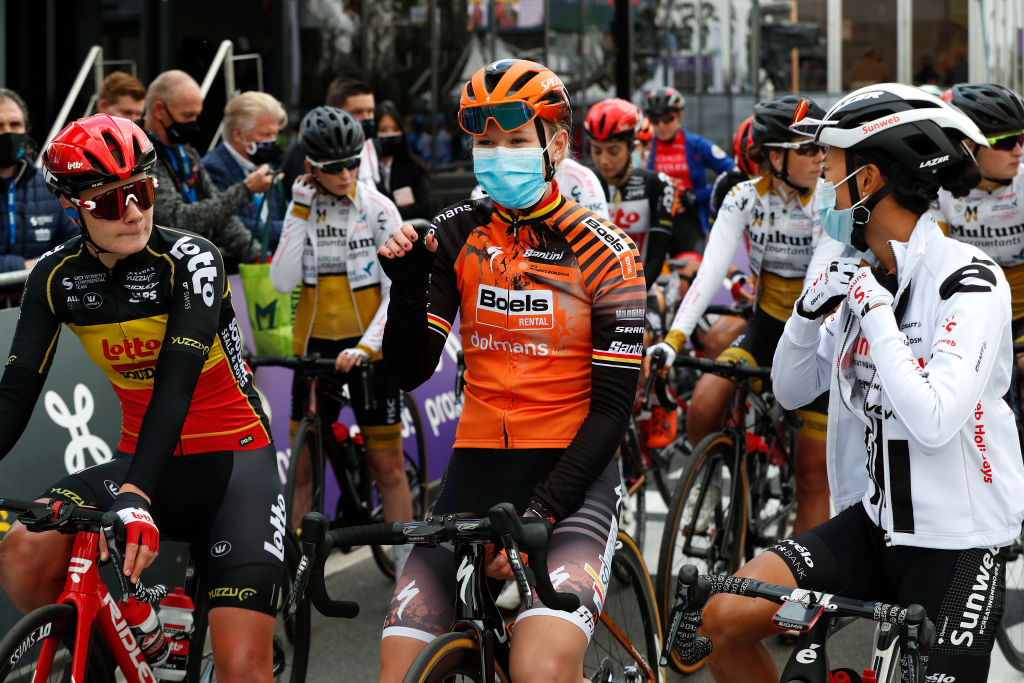
It's a minor miracle that the revised Women's WorldTour has made it as far as the Tour of Flanders. The coronavirus, which halted the season for five months, has returned for a second wave that is affecting many European nations this autumn, including Belgium.
The originally planned 159km race was reduced to 135km, and organisers banned spectators from the climbs and cobbled sectors, along with the start and finish area in Oudenaarde, to help reduce social gathering at the event during the COVID-19 pandemic. They also encouraged fans to instead watch the men's and women's races live on television.
Even before the start, however, four teams were forced to pull out of the race. Defending champion Marta Bastianelli and her Alé BTC Ljubljana squad did not start the race after the team had a positive COVID-19 test ahead of Gent-Wevelgem.
Other teams that pulled out of the race were Astana, Equipe Paule Ka – due to financial difficulties – and Chevalmeire.
Marianne Vos (CCC-Liv), who won the race in 2013, did not start due to not feeling 100 per cent. In addition, former Gent-Wevelgem and Brugge-De Panne winner Kirsten Wild (Ceratizit-WNT) did not start after returning a positive COVID-19 test before Gent-Wevelgem.
Twenty of the initial 24 teams started the Tour of Flanders, including all the WorldTeams, but the race lacked its usual distance, depth and fanfare of previous years.
Lauren Stephens: From Zwift to cobbled Classics
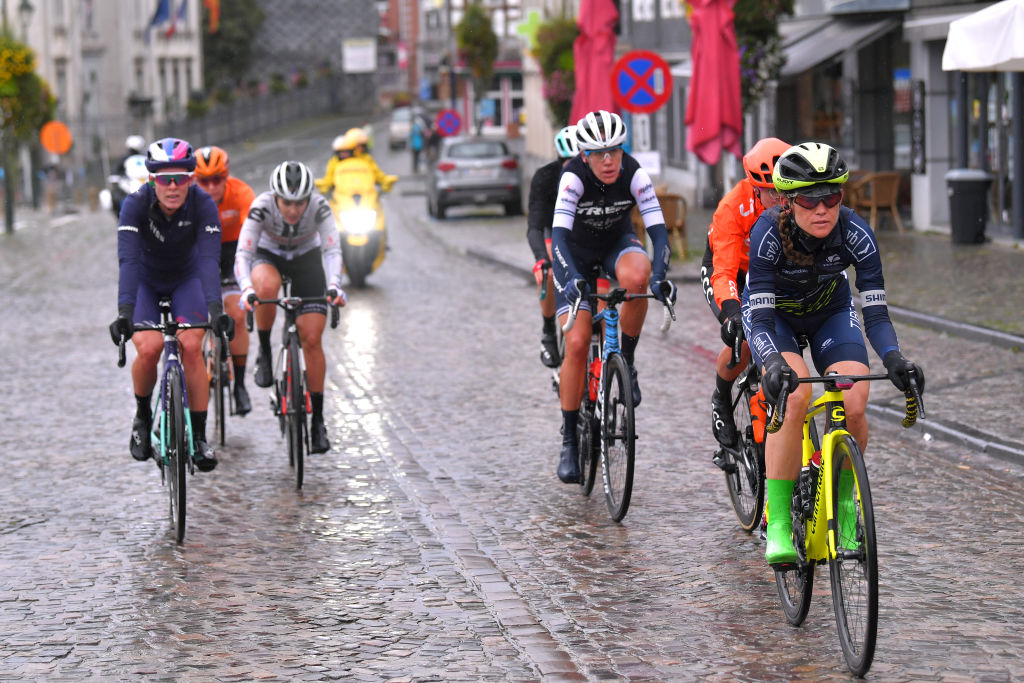
Lauren Stephens (TIBCO-SVB) has had a remarkable series of top-10 finishes in her revised Women's WorldTour campaign, which began after nearly five months of dominating Zwift racing.
There are likely very few similarities between the virtual cobbles on the Zwift platform and those of the real cobbled Classics races, but Stephens has managed to transition from one to the other with ease and success.
TIBCO-SVB announced in July that they had extended Stephens' contract for the 2021 season after her virtual racing success, which saw her win the Virtual Tour de France. During that race, she won the second and sixth stage, and captured two third-place finishes.
TIBCO-SVB travelled to Europe to contest the revised Women's WorldTour that started in August, and the short but highly intense virtual workouts seemed to have paid off for Stephens, especially in the Classics.
She won the overall title at the Tour de l'Ardeche, and finished 10th at Brabantse Pijl, sixth at Gent-Wevelgem and ninth at the Tour of Flanders – the team's final race of the season.
It will be back to Zwift racing for Stephens now, at least until the start of the 2021 Women's WorldTour in Australia in January.

Kirsten Frattini is the Deputy Editor of Cyclingnews, overseeing the global racing content plan.
Kirsten has a background in Kinesiology and Health Science. She has been involved in cycling from the community and grassroots level to professional cycling's biggest races, reporting on the WorldTour, Spring Classics, Tours de France, World Championships and Olympic Games.
She began her sports journalism career with Cyclingnews as a North American Correspondent in 2006. In 2018, Kirsten became Women's Editor – overseeing the content strategy, race coverage and growth of women's professional cycling – before becoming Deputy Editor in 2023.